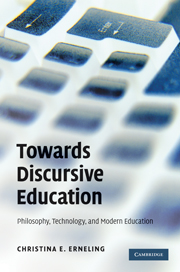Book contents
- Frontmatter
- Contents
- Acknowledgements
- Introduction
- 1 The infantilisation of learning
- 2 Educational technologies and pedagogy
- 3 Piaget and natural learning
- 4 Piaget's conception of the framework: from instincts to intentionality
- 5 The infant as scientist
- 6 The socio-cultural approach to learning
- 7 Towards discursive education
- Appendix
- References
- Index
7 - Towards discursive education
Published online by Cambridge University Press: 05 June 2012
- Frontmatter
- Contents
- Acknowledgements
- Introduction
- 1 The infantilisation of learning
- 2 Educational technologies and pedagogy
- 3 Piaget and natural learning
- 4 Piaget's conception of the framework: from instincts to intentionality
- 5 The infant as scientist
- 6 The socio-cultural approach to learning
- 7 Towards discursive education
- Appendix
- References
- Index
Summary
INTRODUCTION
My focus has been on methodology, discussing the fundamental assumptions about mind, knowledge, and cognitive change that inform contemporary accounts of learning, and not on the actual use of computers in schools. In my case study of computers as educational technology, I have argued that mistaken ideas of mainstream psychology underlie and inform the pedagogical reasons for the educational use of computers to enhance and even to change radically the conditions for cognitive development and learning in schools. Although such mistaken views of learning are only one of the many reasons behind the use of computers in education, it is important to discuss them, since they help structure the situations in which computers are introduced, as well as learning more generally.
As an alternative, I argue that learning and cognitive development are a social symbolic activity through and through, and also a very complex activity involving many different kinds of conditions, many different levels, and many, often conflicting goals.
Let me begin with a summary of some problematic aspects of mainstream psychology's approach to learning and knowledge. I shall then sketch what a discursive approach to learning and education would involve in a more general sense. By doing this, I hope to provide the first steps towards a discursive approach to education. A more substantive account would involve moving beyond my methodological focus, and must await a subsequent book.
- Type
- Chapter
- Information
- Towards Discursive EducationPhilosophy, Technology, and Modern Education, pp. 156 - 181Publisher: Cambridge University PressPrint publication year: 2010



